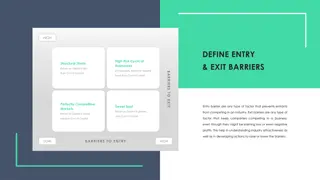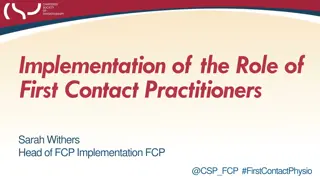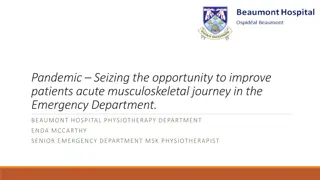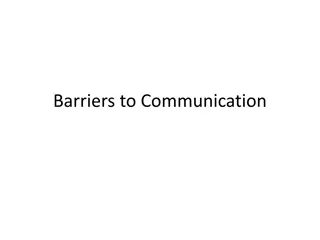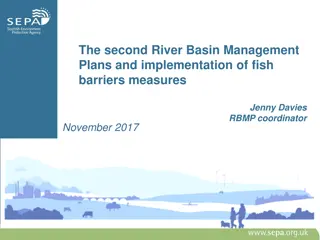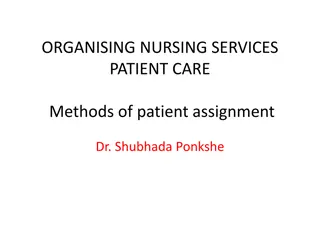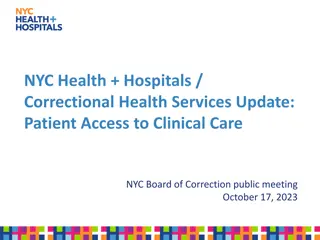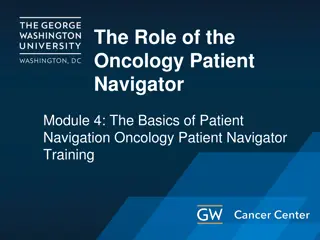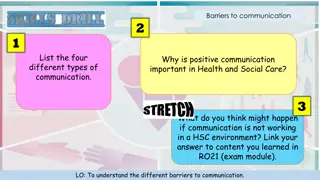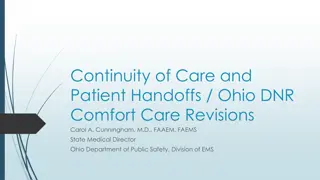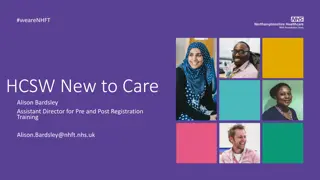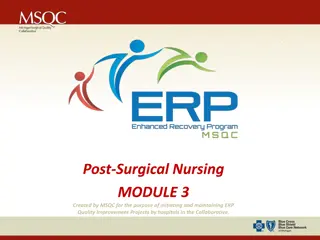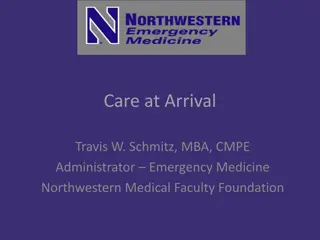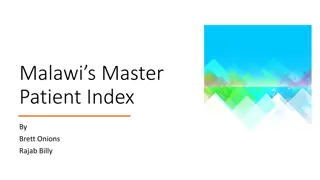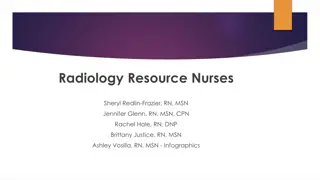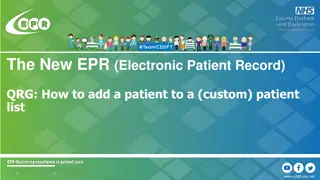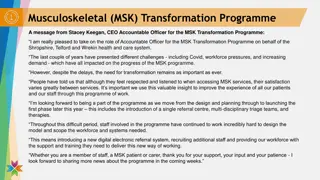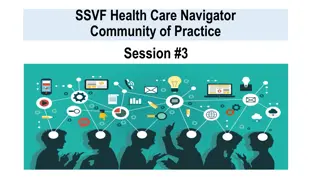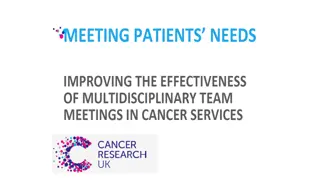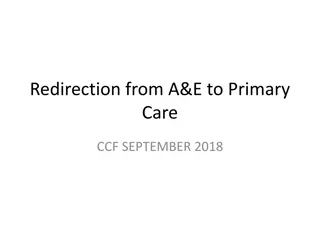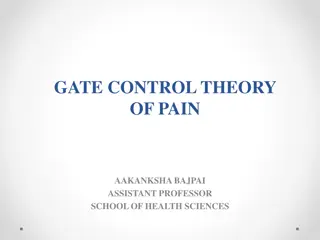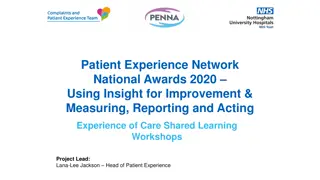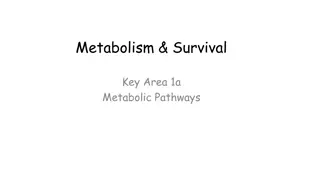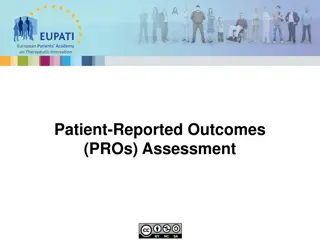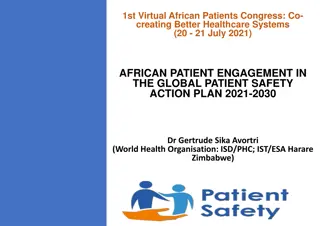Understanding MSK Patient Pathways: Barriers and Solutions
The project aims to explore factors influencing trends in hip replacements and outpatient appointments, focusing on patients from different socioeconomic backgrounds. It involves in-depth analysis, interviews, and engagement with various stakeholders to understand patient pathways and improve services. Challenges in design adjustments and approvals highlight the importance of ethics and resource allocation in healthcare research.
Download Presentation

Please find below an Image/Link to download the presentation.
The content on the website is provided AS IS for your information and personal use only. It may not be sold, licensed, or shared on other websites without obtaining consent from the author. Download presentation by click this link. If you encounter any issues during the download, it is possible that the publisher has removed the file from their server.
E N D
Presentation Transcript
Exploring MSK Patient Pathways Facilitators and Barriers. And The Way Forward Rosie Smithson and Bruno Barbosa - Healthier Futures Academy Carolyn Casey - Consultant Physiotherapist July 2023
What is the starting point? Hip Problem Definition: Started with Quantitative data = patients from more deprived backgrounds are less likely to have Hip replacements Analysis also indicates a trend towards most affluent having more Outpatients Appointments Strongest Hip Replacement trends were in Sandwell and Walsall We were asked to shed light on factors influencing this trend through understanding patients experiences Refine Problem Definition: Deep dive into Strategy Unit report Existing research and policy/practice guidance Develop understanding of the pathway Explore Hip Consultants hypothesis Attempted further quantitative analysis Create a Focus: On the whole pathway, experience of each stage , facilitators and inhibitors, understand the individual s world Flexible method to explore a range of pathways Focus on surgery decisions where patients reach this stage 2
Project Design Initial Design: 10-12 Semi-structured interviews in Sandwell and Walsall with a mix of most and least deprived patients Accessed through secondary and primary care patient lists With patient and staff co-production workshops Patient and Staff Experts: Projects ideally involve a range of stakeholders to understand a range of patient pathway experiences and staff experiences of planning and delivering services Recommendations are grounded in both sets of experiences Amended Design: Accessed through voluntary and community organisations No access to patient lists meant could not select list of patients appropriate for surgery, who did or did not have Patients Clinical Leads Final Design: Predominantly most deprived patients Extended to Knee arthritis Two focus groups with advanced physiotherapists No plans for co-production workshops Clinic Nurses Pain mgt staff NHS Managers Physio staff Consultants Support VCOs 3
Project Approvals Approached Trust Research and Development Teams who approve research within secondary care Walsall defined as formal research requiring Health Research Authority approval. We did not have resources for this and as a result could not recruit via secondary care NHS lists. Ethics DPIA For the whole project and transcription company (+ procurement). Purpose, data collected, method, data storage & retention, consent, confidentiality, Caldicott Guardian (full DPIA) as gathering sensitive data. DPIA Approval and comments from Clinical Leadership Group and the MSK Clinical Learning Network. Consultation with Orthopaedic consultants and Place Transformation Leads. CLG, CLN & Trusts 4
Fieldwork to Dissemination Venue and Method Information sheet & consent form Patient Recruitment Interviews Digitally Recorded Pre- Screening Patient Preference Via VCS Frame Overall Argument Transcribed Thematic Analysis Report Writing and Coded Information Sheet & consent form Disseminate Results Physio Staff Focus Groups 5
Information Sheet and Consent form: The Fundamentals Who is conducting the project and why? How information gathered will be used & intended outcomes Eligibility for taking part The ask: interview, duration, method, sensitive/personal info gathered, managing expectations Gifts/recognition Confidentiality and anonymity Duty to report harm Voluntary participation and details of withdraw Collection, storage, sharing and deletion of data gathered Written and audio records Contact details How to complain Consent sheet: asking for explicit permission against key aspects Traditionally signed paper copies, sometimes scanned signature; for this project verbal consent Confirm received and understood at the start of the interview Healthier Futures, Black Country and West Birmingham 6
Interview Schedule Developed in collaboration with Clinical Lead Expert and Project team Introduction: Revisit informed consent Length interview Stop, take breaks etc. Audio recording, start recorder Shopping voucher delivery Circulated to Orthopaedic Consultants Essential interviewers know the schedule well, can move back and forth through the questions Take account of numerous pathway variations: Primary care Patient initiated actions (or not) Physio (or not) Consultant (or not) Pain injection (or not) Offered surgery (or not) Accepted surgery (or not) Waiting list Discharged to GP Had surgery Opening question: Can you tell me a little bit about when your hip arthritis developed and the impact it was having on your day-to-day life? End housekeeping: Thank you Copy of report Address for vouchers Experimented with multiple structures and piloted 7
Fragmented Pathway: Findings Framework Organisational Factors e.g., Processes, Policies Arthritis Pathway Practice, Culture Smooth Journeys Fragmented professions/services Service Design Patients move between professionals/services Complex Journeys Patient Factors Patients need to co-ordinate and self-manage e.g., Health literacy Patients have variable awareness and understanding of pathway and their role Communication skills Resources Values, Perceptions, Beliefs 8
Key Patient Reported Findings - PRINT 4. Referrals & experiences of secondary care Long periods with no communications Waiting for referrals and appointments Cancellations and need to chase Not integrated Impact on mental health Lack of patient choice 1. Appointment Booking & Communications Phone and online booking issues Making secondary care appointments Waiting until conditions are advanced Missed hospital phone appointments 2. Primary care appointments Mixture of positive and negative experiences Some patients felt dismissed 10 min appointments Lack of continuity in professionals Need to push for referrals Often direct to imaging referrals 5. Orthopaedics surgery decision making Decisions based on: condition severity, age re: replacement longevity, and BMI Very limited weight loss support and info Declined patients felt left to live in pain No plan of when surgery may happen Mixture of excellent communication by consultants, through to poor understanding 3. Conservative management Many had physio referrals, but sometimes late in the process. Only one FCP experience Limited No. physio sessions, not convinced of benefits, varied engagement, pain experienced Ineffective pain relief, not explored in Apts Limited understanding of conservative mgt; focus on secondary care referral and potential surgery Injection waiting times 6. Patients surgery decision making Patients considered: Pain, previous surgery, financial position, future ability to work, recovery support, health risks, others surgery stories Negative previous surgery, unsuitable housing and other life/health stressors had greatest negative impact on decisions 9
Patient Reported Findings 1. Appointment Booking & Communications 3. Conservative management 2. Primary care appointments It s still painful when you are doing the exercises, but it s helped My current doctor has listened; I wouldn't know what was wrong. He explains more than the hospital You can't get through. The system cannot cope I try to do them, but I don't feel like they listen. It's the pain I m in Fill the form in online, I m really slow at it, then it says, Ring your GP for an appointment One GP was excessively dismissive. Well, what do you expect? We all get knee pains as we get older . He focused on my weight, made a judgement, he did not listen They just put me on the list that's all but I haven't heard anything more Now they send a letter, and you have to book. We aren't good with technologies, and getting through on the phone is hard I just threw the exercises in the bin If you were taking your medications, you wouldn t be in pain . I felt angry because I m taking all of them That s about 4 things you ve asked. You ve had your 10 minutes . They couldn t wait to get rid of me. I m limping out, she didn t ask about my hip I hate being a nuisance, I ll put up with things until they are really getting to me I don't know if I m meant to have aspirin and ibuprofen, and paracetamol, I'm having them anyway Both legs are really swollen. The consultant cannot see that, face-to- face would be better I think I have something wrong with my leg. I want a scan . They referred me, I didn't think they would, a lot of the time you can't get what you want I don t want to suggest I know better. How can I say, is it possible to have the injection in a hospital? 10
Patient Reported Findings 4. Referrals & experiences of secondary care 5. Orthopaedics surgery decision making 6. Patients surgery decision making We ll call you in 3 months . They never rung back. If we hadn't phoned, I don't think I'd have got this appointment I was worried about having the operation, because of things that could go wrong, but I needed it, I was in so much pain It s worn out. When do you want to come in? It will seize if don t have it Hip surgery, only lasts for so long? Ten years? He was leaving it until I'm older They cancel appointments 6 or 7 times. I got appointment letters, and the next day another saying it s cancelled I wanted to earn as much money as I could, for after the operation. I will need someone to look after my dog, and all the rest of it What am I to do for 20 years? The pain is worse. No reviews, and you don't get any other information. Will it get to the stage I can t walk? You kind of go off the radar My daughters are busy with their children. My Social Prescriber will probably keep an eye on me You re obese, We have to take you off the list . I was devastated The pushing, it s draining, takes a lot of time and energy, chasing things up Really good. He had the x-ray and explained it well. He was very professional and helpful Dead worried, I've been smoking for years. This was in my mind [but] it didn t occur to me to ask the consultant I do not like Sandwell, I prefer city. I had things go wrong at there They asked if I've got a preference, a local hospital? I said, No, I'II travel, get me the one with the shortest list . They could explain things a lot better, what osteoarthritis is, the changes. Don't just say, You've got hip arthritis 11
Treatment Triangle Lohmander, L, S. and E, M. Roos. (2007). Clinical Update: Treating osteoarthritis. The Lancet. 370. (9605). pp. 2082-2084. https://doi.org/10.1016/S0140-6736(07)61879-0 (Accessed on 04/05/2023) 12
Our Patients Wider significant health issues Mild to very debilitating and painful Arthritis Many lived alone High deprivation & Limited resources Difficulties functioning at home Made self-management hard Made overcoming barriers hard Less able to utilise opportunities Dependant on others Social housing Restricted activities outside the home Individual s Lived Experience Low levels of employment Values (e.g. burden, professionals know best) Middle to older adulthood 50 s to 80 s Varied Health Literacy and Confidence Perceptions Service Experiences 13
Improvement Options 4. Personalised Support for MSK Mgt Identify staff to deliver Personalised Support e.g., FCPs, MSK trained Health Coaches, Tier 2 services. Shared Decision Making Surgery education and expectation mgt Support patients to access surgery where appropriate treatment Create share care plans Educate/Prepare for re: secondary care apts Help overcome pathway barriers Help mgt other interacting LTCs Support weight loss Strengthen physio referrals and education/ motivation re: importance Pain mgt coaching Signpost to other services 1. FCP Assessment Appointments Consistent use of FCP as first point of call for MSK patients. Promote expertise of role. Ensure accessing conservative mgt options and triage before Orthopaedics referrals 2. Longer Primary Care Appointments More time for patients and GP/primary care staff to understand MSK condition and interaction with other health issues. Raise awareness of conservative mgt 3. Regular MSK Reviews in Primary Care Oversee long-term mgt: monitor progression, referrals, address drift, medication reviews . Create OA register to identify patients ideally in QOF incentivised Ensure meet cultural and language needs 14
Improvement Options 5. Improve Communications and Explanations in Secondary Care Use of visual aids in explanations, leaflets, writing notes, contact print outs, simple language Staff to debrief patients as leave apt, check understanding and next steps Ensure access to physical and virtual apts, to assess condition progression 7. Review Surgery Measurement Outcomes Review outcomes to reflect the complexity of working with more complex and vulnerable patients need more resources Link surgery with these patients to ICB delivery of core20+5 agenda? Do tariffs adequately reflect the complexity of surgery with these patients? 6. Surgery Decision Making & Communication to Patients Improve patient understanding and engagement in decisions; SDM Raise awareness of patient choice Review how BMI criteria applied and impact of harmonisation policy. Case by case approval BMI 40 + Review explanations of age/severity when surgery may be appropriate Ensure future aspirations considered in decisions, not just current activities - How reduced pain and increase mobility may expand patient activities? 8. Review the Patient Initiated Follow-up Policy (PIFU) for MSK patients Clearly set out how PIFU can be used by MSK patients to request follow-up Raise awareness and explain to patients Help avoid drift and having to start the referral process again 15


